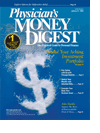It Pays to Maintain the Right Attitude
Money
According to a recent article,investing is a source ofagony for many investors today.That's because these investors find it difficult to let go. They become obsessive,tracking and trading on every marketmove, until they wind up with heartburn.Instead, the article notes, investingshould be an anxiety-free process thatlasts a lifetime. And like the tortoise andthe hare, slow and steady usually winsthe investment race.
Expect Imperfections
If you think you know more than youactually do, you're in trouble, especiallyfrom an investing standpoint. The properapproach requires you to not onlyaccept the possibility that you could bewrong, but to also accept the possibilitythat you will be wrong most of the time.To paraphrase Benjamin Graham, who isconsidered the father of investmentanalysis, investors should focus less onguessing how much they'll gain if they'reright and more on making certain theydon't lose too much if they're wrong.
Money
In other words, to ease that investinganxiety, it's important to protect yourself.The article suggests guardingagainst picking the wrong investments bydiversifying your portfolio. Keep some ofyour money in the United States and someabroad in stocks, bonds, and cash. Also,protect against time errors, such as buyingwhen you should sell, by investing thesame amount each month through a dollar-cost-averaging system.
History and Hesitation
Contrary to the popular adage, when itcomes to the financial community, historydoes not always repeat itself. Want someproof? In the early 1980s, if you were consideringinvesting in long-term bonds andhad reviewed past performance (ie, from1932 to 1981), you would have found thattheir annual rate of return was just 3%,far below what stock returns averaged.However, according to Ibbotson Associates,during the following 20 years (ie,from 1982 to 2003), long-term bondreturns averaged 11.8% annually.
The history lesson here is that youshould never judge past returns by a singlemeasurement period. Rather, consideras many periods as possible to get a betteroverall picture—and factor in ahealthy dose of common sense. Of course,there's another old expression: "He whohesitates is lost."Too often, investorsthink they have to act quickly to get in ona good thing. The truth is, sometimes noaction is the right action.
Money
According to the article, dozensof finance professors and researchersagree that, over time, investors who keeptheir costs down will outperform investorswho don't. In fact, Federal ReserveChairman Warren Buffett estimates thatinvestors pay approximately $130 billion ayear in brokerage costs, fund managementfees, and other expenses. It seemsright to reason that the more you trade,the less you stand to make.
Study results:
Consider the results of a study conductedby researchers at the National Bureauof Economic Research and finance professorsJosef Lakonishok, Andrei Shleifer, andRobert Vishny. From 1983 to1990, the average annual return for largeequity funds was 15.3%; however, if fundmanagers had made no trades after Jan. 1of each year, the return would have been16%. So, if you remove the anxiety fromyour investing life, you'll not only feelmore relaxed, you might also make moremoney.
